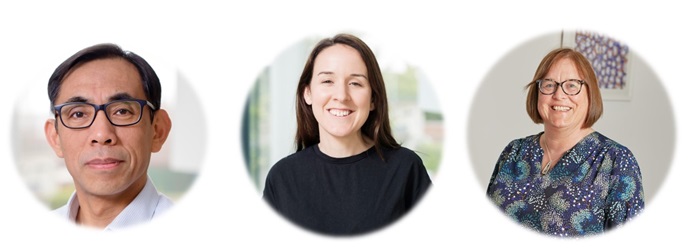Three Conway Fellows receive funding under Research Ireland Frontiers for the Future
Minister for Further and Higher Education, Research, Innovation and Science, James Lawless, TD, announced €34.5 million in funding to support 39 cutting-edge research projects.
Conway Fellows, Professors Geraldine Butler and Wenxin Wang were funded under the Research Ireland Frontiers for the Future Programme Awards stream and Dr Martina Wallace was funded under the Projects stream.
The Frontiers for the Future Programme provides opportunities for independent investigators to conduct highly innovative, collaborative research with the potential to deliver impact, whilst also providing opportunities for high-risk, high-reward research projects.
 Professor Geraldine Butler (pictured right) from UCD School of Biomolecular and Biomedical Science and UCD Conway Institute will identify yeasts from the Irish environment, particularly soil and rotting wood, that have biotechnological applications.
Professor Geraldine Butler (pictured right) from UCD School of Biomolecular and Biomedical Science and UCD Conway Institute will identify yeasts from the Irish environment, particularly soil and rotting wood, that have biotechnological applications.
Yeasts have many biotechnological uses, from brewing to baking to generating biofuels. The best-known yeast species, Saccharomyces cerevisiae, is used for baking, wine making, and beer brewing. However, there are more than 1,000 other yeast species that remain to be exploited.
“We will develop methods that will facilitate genetic manipulation of these species. We will use a mixture of bioprospecting, molecular biology, and genomics.”
Professor Wenxin Wang (pictured left) is developing a groundbreaking technology to deliver messenger RNA (mRNA) therapies, particularly targeting a rare skin condition called recessive dystrophic epidermolysis bullosa (RDEB).
Prof. Wang from UCD School of Medicine is a Fellow in UCD Charles Institute of Dermatology and UCD Conway Institute. The research is in conjunction with technology company, Branca Bunús Ltd.
“Our innovative approach uses specially designed molecules to stabilise mRNA, making the treatment more effective and longer lasting. The research involves creating these molecules, optimising their delivery into cells, and testing their effectiveness.
If successful, this technology could not only help treat RDEB but also be adapted for other medical uses. It has significant potential to transform the landscape of genetic disorder treatments and beyond, helping address health challenges in Ireland and worldwide.
Dr Martina Wallace (pictured middle) from UCD School of Agriculture and Food Science and UCD Conway Institute is focused on liver fibrosis. This arises when there is an accumulation of excess connective tissue that can lead to liver failure, liver cancer and death.
Metabolic dysfunction associated liver fibrosis is increasing in the Irish population due to increasing obesity rates and unhealthy lifestyle choices. There are limited treatment options for this form of fibrosis.
Dr Wallace is particularly interested in discovering and testing new molecular targets to treat the disease. These targets are related to how the cells that cause fibrosis get the energy and building blocks required to proliferate and create the excessive connective tissue that drives fibrosis.
Announcing the awards, Minister Lawless said: “We are investing in cutting-edge, curiosity-driven research, and empowering individual researchers to progress bold ideas that can lead to groundbreaking discoveries. These awards demonstrate our dedication to building a diverse and inclusive research community that delivers impact for our society and economy. I look forward to seeing the development and outputs of these projects over the coming years.”
Dr Diarmuid O'Brien, CEO of Research Ireland, commented: “Research Ireland’s Frontiers for the Future Programme has, at its core, the exploration of high-risk, high-reward ideas, and the building of collaborative teams that produce excellent research. We are proud to be partnering with Children’s Health Foundation, Breakthrough Cancer Research, and the Sustainable Energy Authority of Ireland, and supporting 66 PhD students, 47 postdoctoral researchers, and 13 other research positions.”
Social Media Links